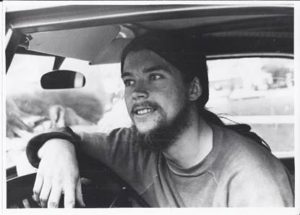“23: July 24”
“24: October 5”
“25: February 19”
“26: December 14”
The words went right to the pit of my stomach.
All doubt was gone.
I’d graduate/be drafted in June.
By September
I’d be in Vietnam.
My high school gym teacher had been an Army sergeant.
He stepped on our stomachs as we did sit-ups,
“toughening us up”.
I’ve had a problem with authority
(unsuited, temperamentally,
to obeying unconditionally).
I’d be a poor soldier in the best of wars.
But if a job required some independence/ingenuity —
a pilot or a spy, say —
and if the cause was right
(World War II, for instance),
I could fight as well as another guy.
I don’t like fighting,
but I’m not so naive as to think it’s never a necessity.
There’s always someone who, given the chance,
will take our possessions and make us their slaves.
So who should decide
if a particular war is justified?
This seemed to be my own responsibility.
Vietnam? I decided it wasn’t.
Weren’t we protecting a democracy?
No. Thieu lacked popular support.
Wouldn’t Thailand and India fall?
No. The domino theory was questionable at best.
Weren’t our national interests at stake?
No, not really.
I’d decided I shouldn’t fight;
They’d decided to make me fight.
The physical was set for March.
Unless I failed,
I’d go to Vietnam,
go to jail for seven years,
or go to Canada for the rest of my life.
In studying Army regulations,
I found a fascinating chart.
It showed for each particular height
the greatest and the smallest weight
the Army would accept.
I’d heard of people who’d gotten out
by injuring themselves intentionally.
Some exaggerated a minor back pain.
Others faked insanity.
Losing weight seemed nobler;
lying/mutilation, not required.
The low for me was 118;
lose twenty pounds and I’d be out.
(At 5’10”, that’s pretty thin.
Could I do it and not get sick?)
My parents thought for sure I’d die.
Help from doctors was out of the question;
on my own I studied nutrition.
Cut down on calories,
maintain needed nutrients
(protein, essential fats, vitamins, and minerals).
Once I found a working combination,
I stuck to it without exception.
Cottage cheese, wheat germ, and fish were staples.
Bored fat cells chose self-immolation.
My weight dropped to one hundred and twenty.
In cases where the weight was close
I’d heard the Army sometimes winked:
(“Oh we’ll fatten this guy up”).
I decided to lose to one hundred and ten.
Contrary to my parents’ fears —
though vigorous exercise made me dizzy —
I really wasn’t sick at all.
The Army sent a special bus
to take us to the physical.
Once there, we stripped to underpants,
moved like cattle from each room to the next.
I weighed 110.
They classified me 1-Y
(examine again in a year;
if still unfit, reject).
Losing again would be inconvenient,
but free of worry since I knew that it worked.
I’d brought some food.
I drank and ate it ravenously.
So what did I feel on that bus heading home?
Triumph? Elation? No.
Relief, sadness, and guilt.
Relief because finally I was free of this mess.
Sadness and guilt because someone else
would be made to go and fight in my place.
It’s true this person, on some level,
had chosen not to escape —
but maybe he just hadn’t thought it through. . . .
Now for a bold statement from a slimy ex-draft-dodger —
I’m sure you’ll think this hypocritical — :
Each of us must be ready to serve.
Responsibility for protecting things we love
can not lie solely with the professional military.
(Future wars could overwhelm them.)
Service isn’t always guns.
Service might be joining the Peace Corps
or electing leaders who effectively distinguish
false threats from real ones — and pre-empt war.
Wars should be rare, thrust upon us.
No more propping up tottering dictators.
No more shoving “Democracy” down people’s throats.
No more sacrificing 10,000 soldiers so we can pay a quarter less for gasoline.
Wars should be necessary and just;
everyone should serve.

Note: This poem is part of the Scraps of Faith collection of poems.
Keywords: army, draft, war, weight loss, draft dodger, service, conscientious objector
